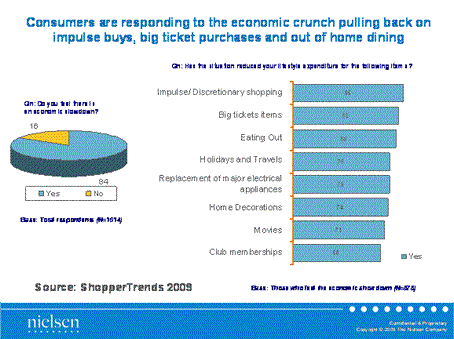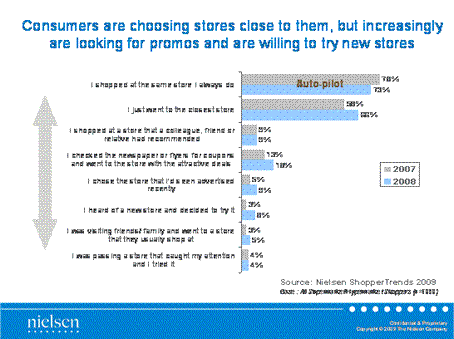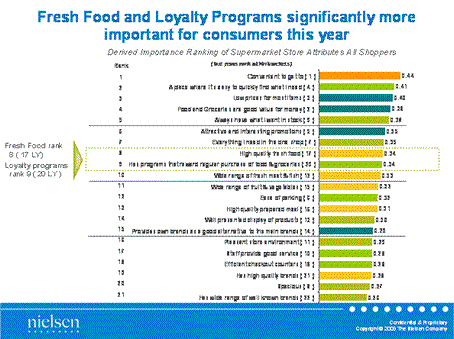| Malaysians Are Pulling In The Purse Strings And Making Significant Changes To Their Lifestyles And Shopping Habits |
 |
 |
 |
| Written by 3K Admin |
| Friday, 04 September 2009 09:28 |
|
1July 2009 Four in five Malaysians are reducing their spend on impulse buys, big ticket items and out-of-home dining as a result of the recession As the global economic crisis wears on without any indication of a forthcoming respite, Malaysians are bracing themselves for a prolonged recession and making adjustments to their lifestyle to curb their living expenses. Recent studies conducted by The Nielsen Company reveal that the current downturn is turning consumers into more demanding, price-sensitive and cautious spenders. “Along with the rest of the world, consumer confidence in Malaysia has hit a low point and fears over job security registered a significant spike among Malaysians in Nielsen’ recent Consumer Confidence study,” commented Mr Richard Hall, Executive Director, The Nielsen Company Malaysia. “The fear of losing their job combined with their pessimism of a prolonged recession is sounding alarm bells, and Malaysians are now turning to belt tightening measurements in bid to tide them through this trying period.”According to the recent Nielsen Global Consumer Confidence survey, consumer confidence in Malaysia plummeted to an all time low, with almost a third (32%) now citing job security as one of their key concerns. A fifth of Malaysians aren’t hopeful the recession will end before the year is over. As a result, consumers are consciously changing their behavior to cope with the rising cost of living and stay within budget. Findings from a separate Nielsen survey – ShopperTrends 2009 – reveal that most consumers (84%) are feeling the effects of an economic slowdown and are slashing back on shopping. The most affected shopping habits are spend on impulse items (86%), big ticket items (82%) and out of home dining (80%). (Chart 1) Chart 1 “Consumers have become more price-sensitive following the high inflation experienced last year, and this is clearly reflected in their purchasing patterns toward basic food commodities, as the recent ShopperTrends findings reveal,” noted Mr Hall. “The Nielsen survey confirmed that majority (96%) of grocery shoppers does notice price changes, and one in five are actually aware of the prices of their regularly purchased items.” When asked how their grocery purchasing habits have changed, eight in ten people indicated that they now buy only the essentials; and over a third (40%) of people are buying the same product but in lesser quantity. Another growing trend uncovered in the study is that Malaysian shoppers are less loyal and are more inclined to store-hop. While many continue to patronize their regular stores (73%) there is a growing trend of shoppers being enticed to try new stores or visit stores that carry promotions (+5%). (Chart 2) Chart 2 “The average Malaysian consumer patronizes at least two to three stores a month, but research has shown that it is actually the high income consumers who are displaying a greater tendency to shop around more,” observed Mr Hall. “These consumers are more brand-loyal and shop around for promotions on their regular brands, whereas the low income shoppers are less of a loyalist. They have a lower inclination to shop around and tend to simply pick out any brands that are on promotion.” Whilst convenience and price continue to be the key factors driving consumers’ grocery store choice, availability of fresh food, which climbed from 17th to 8th ranking, and loyalty programs which jumped 11th to 9th ranking, are two drivers that have significantly increased in importance this year. (Chart 3) Chart 3 “Modern day Malaysians lead hectic lifestyles and are generally tight for time. The availability of quality fresh food in the hypermarket or supermarket means they can also buy their fresh foods at the same time as they do their grocery shopping,” Mr Hall commented. |
| Last Updated on Friday, 04 September 2009 11:56 |




